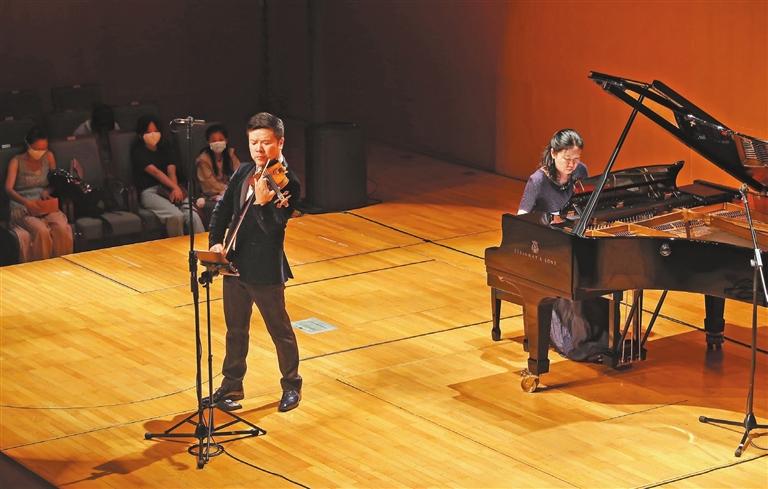
Debra Li debra_lidan@163.com NEARLY eight years after Wang Xiaoming and his Stradivari Quartet graced Shenzhen Concert Hall, the violin virtuoso returned to town with a refreshing program Thursday evening, featuring the works of classical masters like Beethoven and Brahms as well as adaptations from such fan-favorite operas as “La Traviata” and “The Magic Flute.” Collaborating on the show was Huang Yameng, a piano professor with the Central Conservatory of Music (CCoM) in Beijing. Before his encore, Wang told the passionate audience, “I’m full of gratitude that you come to listen to my playing; music is always a two-way dialogue that forms a complete cycle between the performer and the listeners, where all the magical sparks happen.” The concertmaster of Philharmonia Zurich is on a national tour this month that kicked off in his hometown of Jinan, Shandong Province, and has stops in Yixing, Changsha, Shenzhen and Shanghai, until it wraps up in Beijing, culminating in a collaboration with the National Center for the Performing Arts (NCPA) Orchestra. “The classical music audience is familiar with opera overtures and suites performed by orchestras and arias performed by vocalists,” he said. “Opera suites and excerpts performed on the violin are sort of uncommon.” Written by such violin masters as Pablo de Sarasate, Jean Delphin Alard and Henryk Wieniawski, the fantasies based on operas are rare gems of classical music. Beethoven’s “violin Sonata No. 9,” also known as “Kreutzer,” the name of the composer’s contemporary to whom the work was dedicated, is an explosive and demanding piece frequently heard at concerts. In addition to the violin and piano version, Wang will perform the piece with the NCPA Orchestra in Beijing. Moving to Beijing at a young age to study at the CCoM primary school, Wang went on to study at the CCoM and in the second year of college went to study with Gerhard Schulz in Vienna. “Perhaps it’s because of the decade I spent in Vienna, Mozart is the classical master that I look up to and feel a deep resonance with,” he said. “He’s the touchstone for any performing artist, with a colossal oeuvre spanning symphonies, operas and chamber music. I read his biography when I was 6, which is why I aspired to further my studies in Vienna.” Wang said his most unforgettable experience was performing all five Mozart concerti with the China Philharmonic Orchestra in 2019, during which he wrote and performed all 18 cadenzas. Regarding other violinists, Wang appreciates those with a distinctive style, and he is willing to learn from all. “I admire Maxim Vengerov for his passions, Renaud Capucon for his deliberate and profound understanding of music, and Vilde Frang for her exquisite sound and virtuosity,” he said. A first-prize winner of the MIDO International Violin Competition and other events, Wang thinks it not prerequisite for aspiring violinists to win competitions to start a career. “Winning is certainly good, because it offers you a kind of shortcut or entrance ticket, but music is a long progressive career. It’s important to capture every opportunity to learn, practice and perform. As long as there is an opportunity for you to play, grab it,” he said. The founder of MingClassics, a music festival and education program in Switzerland, Wang said he hopes to foster cultural exchanges and bring more Western musicians to perform Chinese works. He also founded StradivariFEST, trying to bring music out of the concert hall and into nature. He is not concerned about the aggressive moves of AI. “Music is about emotions, which AI can’t have, at least for now,” he said. | 
